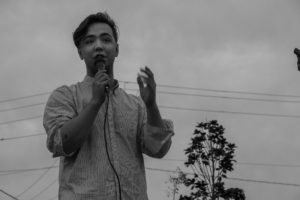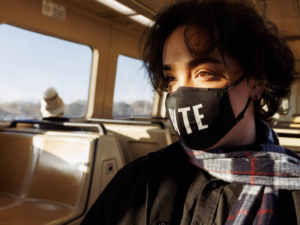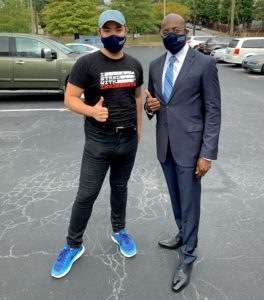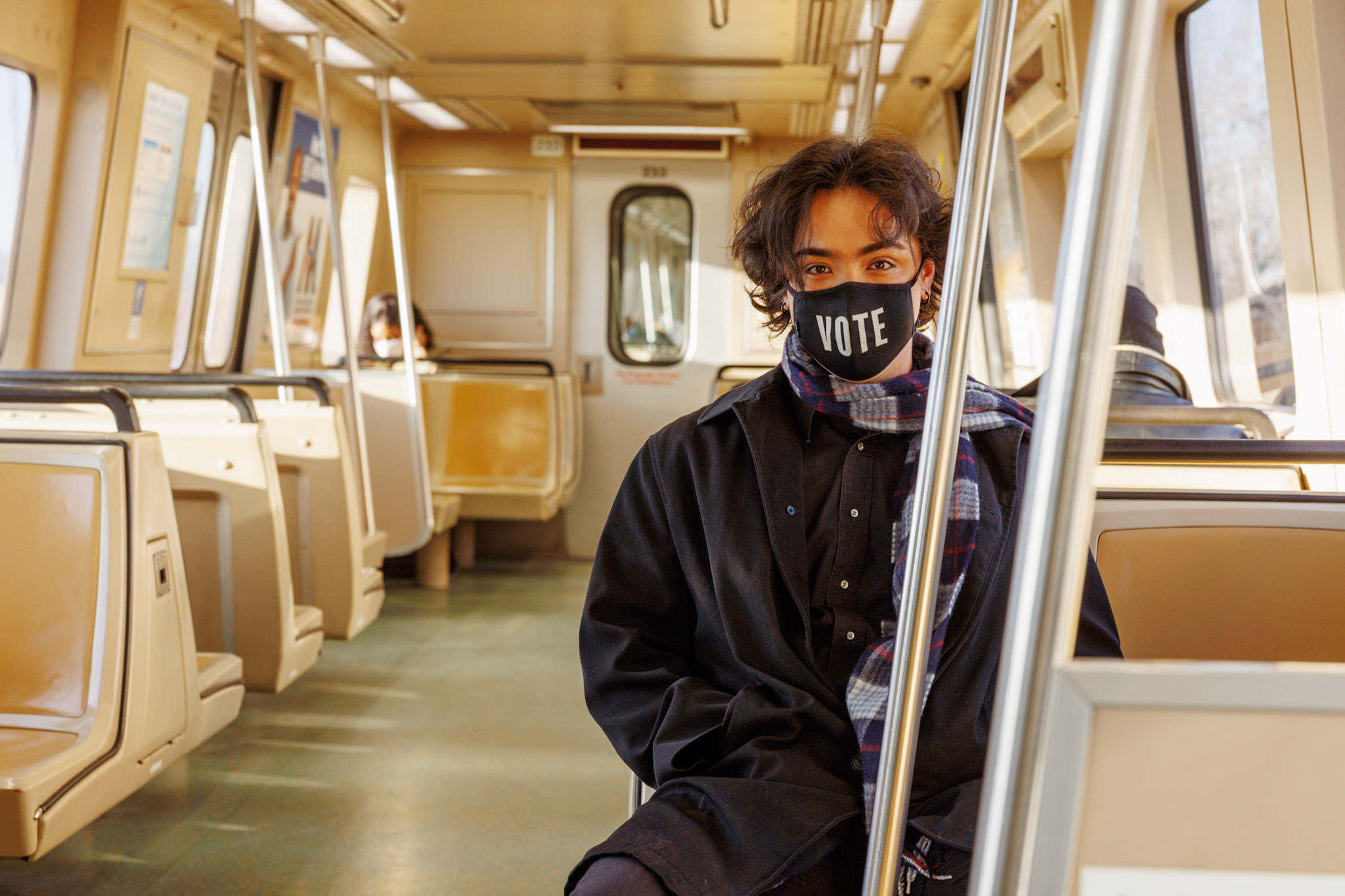Asian-American community organizer and activist Bentley Hudgins has thrown their hat in the ring for Georgia House District 90, a newly created seat that has been redrawn from former House District 89. House District 89 was home to big political names, including gubernatorial candidate Stacey Abrams, and Secretary of State candidate Bee Nguyen. Hudgins, 28, graduated from Union Grove High School in 2011, and Mercer University in 2017.
Having been let down by government institutions, Hudgins has seen their fair share of almost everything in their short life – homelessness, incarceration, job discrimination, and gun violence. But Hudgins has been able to wield their lived experiences and struggles into a tool for unity, community, and better policy making. VOX ATL got the chance to sit down with Hudgins to discuss their vision and goals for their candidacy.
How did you get started in organizing?
I’ve been engaged with [my] community for my entire life. I grew up in a church, and a big part of growing up was doing a lot of work in the community. Growing up, my dad was in charge of the military lounge at the airport. Every Thanksgiving, New Year’s, we spent a lot of time at the airport, making sure that families who are passing through during the holiday season had a place to get together and be family. I grew up during the great recession. One of the impacts from the recession was that my parents’ pay got cut. The state cut the education budget by over a billion dollars. Companies cutting their employees’ paychecks were getting bailed out by the government. I remember being a kid, and looking at what my parents were going through, and knowing that something was wrong. I saw my mom spend thousands of dollars to keep her classroom a place for her kids to be able to learn, and have a safe place to develop and understand more about the world around them. And in response to her investment, and her hard work, the state cut [her] pay and cut school resources. There’s a point [in] the organizing world when you’re radicalized. That was like my first memory of really understanding something is wrong in the world.
Georgia is one of three states with no comprehensive civil rights laws at the state level. And so in Georgia, basically, local governments are the patchwork. So there are cities like Atlanta, and Savannah, and other places where civil rights are affirmed at the local level. Macon didn’t have any. We got together and wrote up some legislation that would protect public sector workers who are LGBT from employment discrimination. This was not like a fast, easy thing. We had to out-organize conservative mega churches, and an incredibly gerrymandered split county commission. So while I was finishing my last semester of college, [at Mercer in Macon] we ended up winning. And that was really when I understood the whole picture. I understood what policymaking could do, that there are ways that laws can be passed, to reduce harm, and also to protect people, and to ensure that we all have equal opportunity to live a very prosperous life.

If elected, you would be the first non-binary representative to the Georgia State Legislature. You’d have to work alongside legislators who are writing bills that could actively harm LGBTQ+ youth. What does this mean to you? What do you say to those who think it’s not your time yet?
My candidacy does represent a couple firsts. One of them is I’d be the first Japanese American to hold this office in Georgia, and I know that I’d be the first non binary person to hold this kind of office, not just [in] Georgia, but the entire south. There are a lot of people that might think that people like me don’t belong in places where laws are made. There are people that might say that I’m not ready, or that people aren’t ready for this. I wasn’t ready to be fired for being queer. I wasn’t ready to continually lose friends almost every month to systemic issues of homelessness and transphobia and racism. What would constitute an appropriate time for people like me, who have a very personal understanding of the failings of our government to run for office? So I think the time is now. It is absolutely time for there to be somebody in the legislature who actually knows what the definition of gender is.
With the rise of hate crimes against Asian Americans and spa shootings last year, why does it matter that Asian voices are amplified in Georgia politics?
One of the things I noticed growing up is the way that we teach American history as a series of battles. Right? It’s like, there was the Revolutionary War, then there was this one, and over the last 100 years, the majority of the extent to which I was taught about Asian people in America was through the context of two things. War and pandemic. We were fighting people in Afghanistan and Iraq. China, bad. Korea is bad. Vietnam is bad. It was this very adversarial relationship with Asia: West versus the East. It’s just that whole trope of yellow peril, and how it relates to Asians taking jobs, Asians spreading disease. And so, of course, when you look at non Asian folks [who] have anti-Asian sentiment, what is the root of anti-Asian hatred and discrimination and violence?
In response to the Stop Asian Hate rally that I helped organize, a lot of folks in the AAPI community felt like education needed to be addressed. The way that we teach newer generations about Asian Americans needed to be talked about and they needed to be redressed. We’re saying that there is a problem and the way that we teach people about non white people in this country and queer people and women.

What are some major issues facing District 90 that you hope to tackle head on?
I’m running a values-based campaign, and the things that I care about are things that working people in DeKalb County understand need to be addressed. But one of the most pressing issues in our community is housing. People’s property taxes keep going up. Because property [values] keep increasing. You can sell your house and that’s great, but where are you going to move? This is a short-sighted understanding of how to manage property and the city and in DeKalb County more generally, is causing us to lose and displace so many valuable people. Also, as a young adult, how the heck are you supposed to start a life and begin a career and pursue opportunity if you can’t afford to live anywhere?
Another opportunity to really strengthen our community is justice and policing. We live in a world where we spend hundreds and hundreds of millions of dollars on a system that does not actually promote public safety. It just doesn’t work. And we have known for so long that the way to reduce violence and to promote the public well being, and public safety is to invest in things like education, and health care, and infrastructure, and workforce development. For economic opportunity for wraparound services. It is very well documented that making sure that people have what they need to live a good life is the best way to have a safe community. I think that we can definitely reimagine public safety and think about how we actually can take care of one another.
Here are my five values: dignity for working families, healthy communities, investing in our future, and justice in our communities, free and fair elections, protecting the right to vote, making sure that we can vote without intimidation. Georgia is an at will employment state (workers do not have a secured right to organize). So, I’m really pro labor, pro union, making sure that working people have the right to collectively bargain. We also need to increase the minimum wage and tie it to inflation and tie it to the cost of living. For healthy communities, we need to expand Medicaid. Like that is such a bare minimum. It’s infuriating that it’s still even on the table. We need to decriminalize mental illness. We need to decriminalize pot. We need to decriminalize sex work. We should be decriminalizing HIV, we need to decriminalize non-violent behavior.

What are some of the advantages and disadvantages of being a younger candidate?
So let me say this, and I want to be very clear, I really appreciate the wisdom and the experience of our elders. There are a lot of people who have done so much that I’m incredibly grateful for. But as a younger person, there’s just a fire that we have–there is a balance that we bring to a decision-making body.
Right now, the composition of the legislature does not represent the community as a whole. It’s [as] people will say, a stale male pale majority. I don’t think that people who have not rented an apartment in this millennia should be deciding that local governments should not be allowed to pursue housing policies that best fit the community.
I grew up during the great recession. And we were still being fed this promise that if you work hard enough, and you get good grades, go to college, get your college degree, and then go to a job, that job will pay you good money. Money that will help you pay off modest student loans, and then you get to buy a house, and that house can accrue interest, and then you can retire on that house. And your children can get that house or they can sell it, like that. The myth of the American dream was ingrained in our upbringing.
Today, say you are somebody who [is] working an average wage job. In the city of Atlanta, or in DeKalb County more generally– What single median income household can afford to buy a house? In no way do I want to disregard the experience and the wisdom of people who have come before me. But at the same time, we need a voice of what people are facing right now, of perspectives that have purposely been left out of the policy-making process.
What message do you have for Atlanta youth?
You matter. Your voice is important. Your words have meaning. Your perspective is needed.
To learn more about Bentley Hudgins’ campaign go to their official campaign website.
Photos courtesy of Bentley Hudgins for Ga. House District 90 campaign




